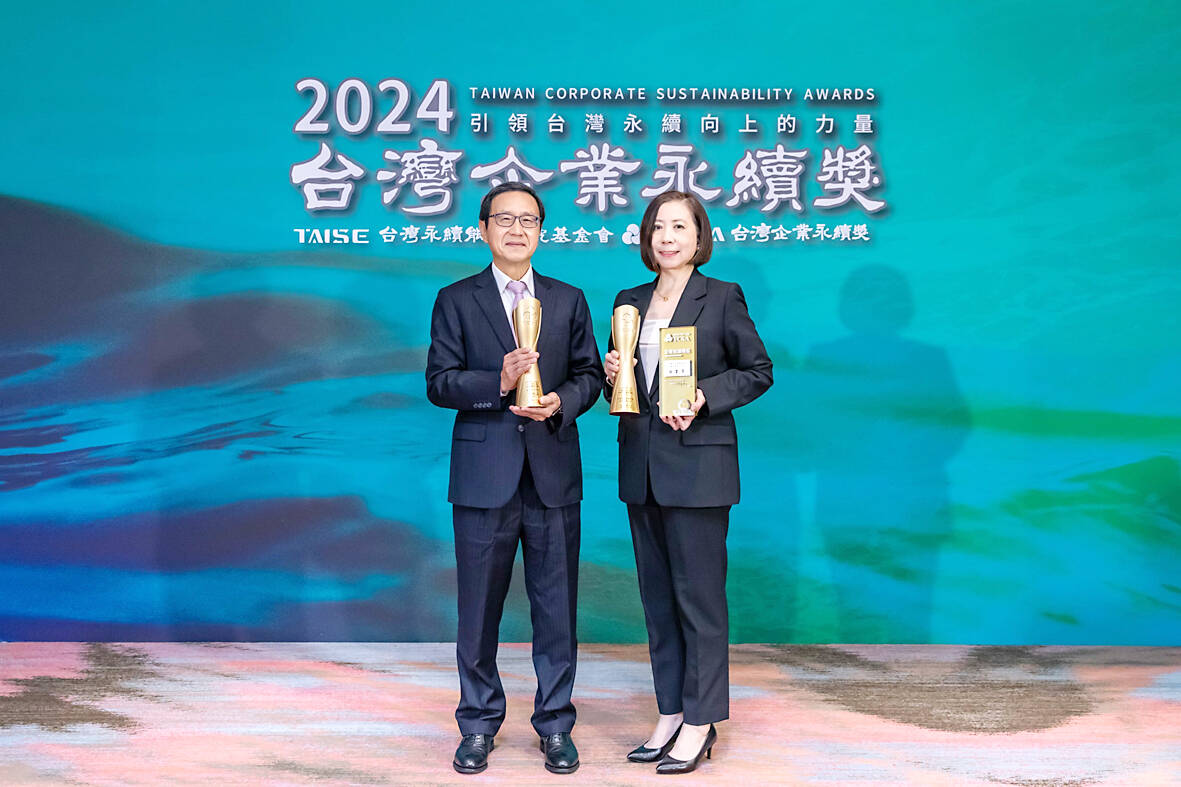At this year’s Taiwan Corporate Sustainability Awards ceremony organized by the Taiwan Institute for Sustainable Energy on Wednesday, CTBC Financial Holding Co (中信金控) won the Comprehensive Performance Award and three Corporate Sustainability Report Awards, the company said in a statement.
In addition, James Chen (陳佳文), chairman of CTBC Financial subsidiary CTBC Bank (中信銀行), also took home the Outstanding Sustainability Professionals Award, the third time that CTBC Financial has won the most prestigious honor for individuals at the Taiwan Corporate Sustainability Awards, it said.
CTBC Financial has emerged as a big winner at this year’s Taiwan Corporate Sustainability Awards after receiving eight accolades spanning various categories last month, it said.

Photo courtesy of CTBC Financial Holding Co
Chen and CTBC Financial president Rachael Kao (高麗雪) accepted the awards from Minister of Economic Affairs J.W. Kuo (郭智輝).
In the past few years, CTBC Financial has introduced international sustainability initiatives to align with global standards when Chen was the company’s president. He encouraged the company to plan its own carbon reduction and green energy deployment plans in accordance with science-based targets, as well as use investment and financial means to support national green energy policies and assist clients to reduce carbon emissions.
Meanwhile, Chen also served as the first chairman of the Coalition of Movers and Shakers on Sustainable Finance, which was established in 2022 by five financial holding companies, including CTBC Financial.
As for CTBC Bank, the lender established a dedicated team in 2017 to cooperate with Danish offshore wind power developers Copenhagen Infrastructure Fund P/S and Orsted A/S. It is the only financial institution in Taiwan to serve as a financial adviser to developers of five offshore wind farm projects.
The lender has also organized financing for offshore wind power projects, including the largest syndicated loan in the Asia-Pacific region for the Hai Long project, to assist the government in promoting energy transformation.
Since last year, the strategic alliance between CTBC Bank and the Industrial Technology Research Institute has helped small and medium-sized enterprises to solve funding and technology problems. So far, it has completed net zero counseling for 26 corporate customers.
CTBC Financial said it has adopted a sustainability strategy guided by the three pillars of “responsible operations,” “sustainable growth” and “co-prosperity in society.”
In addition to responding to the sustainable development goals, the company promotes the low-carbon economy and inclusive finance, which allowed it and its subsidiaries Taiwan Life Insurance Co (台灣人壽) and CTBC Securities Co (中信證券) to win several accolades spanning various categories in this year’s Taiwan Corporate Sustainability Awards, the company added.
CTBC Financial also proactively pays attention to biodiversity issues while promoting environmental sustainability, the company said, adding that it aims to launch 30 initiatives with its partners by 2030 to protect Taiwan’s natural resources and species.

Sweeping policy changes under US Secretary of Health and Human Services Robert F. Kennedy Jr are having a chilling effect on vaccine makers as anti-vaccine rhetoric has turned into concrete changes in inoculation schedules and recommendations, investors and executives said. The administration of US President Donald Trump has in the past year upended vaccine recommendations, with the country last month ending its longstanding guidance that all children receive inoculations against flu, hepatitis A and other diseases. The unprecedented changes have led to diminished vaccine usage, hurt the investment case for some biotechs, and created a drag that would likely dent revenues and

Macronix International Co (旺宏), the world’s biggest NOR flash memory supplier, yesterday said it would spend NT$22 billion (US$699.1 million) on capacity expansion this year to increase its production of mid-to-low-density memory chips as the world’s major memorychip suppliers are phasing out the market. The company said its planned capital expenditures are about 11 times higher than the NT$1.8 billion it spent on new facilities and equipment last year. A majority of this year’s outlay would be allocated to step up capacity of multi-level cell (MLC) NAND flash memory chips, which are used in embedded multimedia cards (eMMC), a managed

CULPRITS: Factors that affected the slip included falling global crude oil prices, wait-and-see consumer attitudes due to US tariffs and a different Lunar New Year holiday schedule Taiwan’s retail sales ended a nine-year growth streak last year, slipping 0.2 percent from a year earlier as uncertainty over US tariff policies affected demand for durable goods, data released on Friday by the Ministry of Economic Affairs showed. Last year’s retail sales totaled NT$4.84 trillion (US$153.27 billion), down about NT$9.5 billion, or 0.2 percent, from 2024. Despite the decline, the figure was still the second-highest annual sales total on record. Ministry statistics department deputy head Chen Yu-fang (陳玉芳) said sales of cars, motorcycles and related products, which accounted for 17.4 percent of total retail rales last year, fell NT$68.1 billion, or

In the wake of strong global demand for AI applications, Taiwan’s export-oriented economy accelerated with the composite index of economic indicators flashing the first “red” light in December for one year, indicating the economy is in booming mode, the National Development Council (NDC) said yesterday. Moreover, the index of leading indicators, which gauges the potential state of the economy over the next six months, also moved higher in December amid growing optimism over the outlook, the NDC said. In December, the index of economic indicators rose one point from a month earlier to 38, at the lower end of the “red” light.